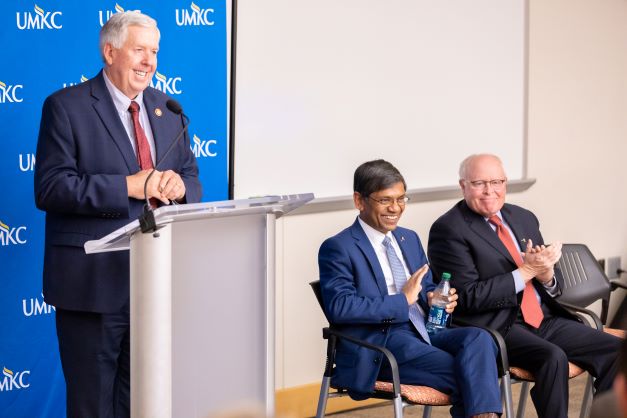New cutting-edge educational facility will serve as a catalyst for growth and position the district to become a premier academic medical district
The University of Missouri-Kansas City announced a $30 million gift today from the Sunderland Foundation to help fund a new state-of-the-art medical and dentistry building in the UMKC Health Sciences District. The project will escalate momentum for expanding the district into a major regional academic medical center that can provide innovative health care, attract top medical students and researchers and generate billions of dollars in jobs and economic development, while advancing care for the underserved.
The multi-story, $120 million Healthcare Innovation and Delivery Building will house new dental teaching clinics and expanded medical school teaching facilities. In addition, it will provide space for the UMKC Health Equity Institute, the university’s Data Science and Analytics Innovation Center and its new Biomedical Engineering program.
“We are grateful to the Sunderland Foundation for their investment in taking the Health Sciences District to the next level, spearheading an academic medical center with extraordinary community benefits,” said UMKC Chancellor Mauli Agrawal. “This gift — by a local foundation that supports making big positive change in Kansas City — is an investment not just in a building, but in a truly big, longer-term vision. We believe our new building will escalate momentum to exponentially expand the Health Sciences District in coming years to become the major regional academic medical center that we know it can be.”
On hand today to help announce the gift was Gov. Mike Parson, who in July signed legislation from the state of Missouri to appropriate $40 million for the building. This appropriation came with a challenge to the Kansas City community to raise the additional funds needed.
“We are proud to support the efforts of UMKC to improve educational opportunities in science, technology, engineering, and math to expand health care access in the state of Missouri, particularly in rural areas,” Parson said. “Missourians will reap the benefits of increased collaboration between health care services and the data science and biomedical engineering programs that will share the building. This partnership could help further health outcomes through new, innovative solutions right here in Missouri.”
Grants from the Sunderland Foundation focus on brick-and-mortar projects for established organizations to foster a stronger, safer and more vibrant future for the communities it serves.
“The Sunderland Foundation is proud to give to UMKC’s efforts to transform the Health Science District,” said Kent Sunderland, chairman of the Sunderland Foundation. “The cutting-edge facilities will provide innovative training opportunities for tomorrow’s doctors, dentists and healthcare leaders who will improve prosperity in our neighborhoods, cities and state. The Sunderland Foundation and UMKC share a mission of caring for the underserved and lifting neighborhoods.”
UMKC is one of only 20 universities in the country where schools of Dentistry, Medicine, Nursing and Health Studies and Pharmacy share a single, walkable campus, an arrangement that facilitates interprofessional training for students and opportunities for research collaboration among the health sciences.
Additionally, the new building will create opportunities for increased collaboration among UMKC and its health district partners including University Health and Children’s Mercy, which allows for a greater capacity for finding health solutions and providing patient care. This project will expand UMKC’s mission to elevate health equity across Kansas City, including many initiatives that work with the underserved including UMKC’s dental clinics, the Sojourner Clinic and the Center for Health Equity, which works through a network of churches in the urban core.
More About the Building
UMKC will occupy the first several floors of the project and additional floors may be available to public partners for medical office space, clinical space and other uses. University Health has already expressed interest in using space in the building to bring more of their support staff on campus.
Here’s what will be housed in the UMKC space:
School of Dentistry
UMKC has the only public dental school in the state of Missouri, as well as the only school in-state with dental specialties. New cutting-edge technology for Dentistry will serve students as well as the community, allowing for a lower cost dental care and faster turnaround time for patients, as well as the ability to implement a teledentistry program to further expand the program’s reach.
School of Medicine
The new building will provide state-of-the-art educational facilities for UMKC medical students and programs, such as space for more simulation labs, which lead to better training for students and better care for the community. UMKC will be able to educate more doctors, meeting critical needs in Kansas City, the region, the state and beyond.
UMKC Health Equity Institute
The UMKC Health Equity Institute was founded in 2019 to tackle complex and systemic health disparities and their root causes. UMKC students and faculty meet people where they are – in community groups and at local churches – and use their research strengths to bridge the gap in health care experienced by Kansas City’s underserved populations.
Biomedical Engineering
Proximity between doctors and developers of medical devices is paramount, and this new building will foster faster, more effective collaboration between engineers and medical professionals to accelerate product development in areas such as imaging technology, implants and microsurgery tools. UMKC will expand its ability for creating new technology, generating innovations for products and patents with the potential to work with companies to develop and produce them.
Data Science and Analytics Innovation Center
Through its expertise in data science, UMKC and its clinical partners are ushering forward a new era of personalized health care — one that will treat diseases based on individual variability in genes, environment and lifestyle, rather than a traditional one-size-fits-all approach. The data center’s work will drive innovation in a variety of domains, ranging from health care and business intelligence to agriculture and digital humanities.

